Keynote Speakers
Systemic Risk: Identifying, Addressing and Governing Global Threats
Ortwin Renn, President of SRA, University of Stuttgart, Germany
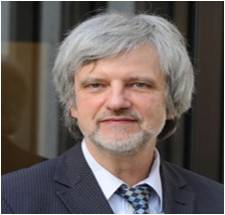 Ortwin Renn serves as full professor and Chair of Environmental Sociology and Technology Assessment at the University of Stuttgart (Germany). He directs the Stuttgart Research Center for Interdisciplinary Risk and Innovation Studies at the University of Stuttgart (ZIRIUS) and the non-profit company DIALOGIK, a research institute for the investigation of communication and participation processes in environmental policy making. Renn also serves as Adjunct Professor for “Integrated Risk Analysis” at Stavanger University (Norway) and as Affiliate Professor for “Risk Governance” at Beijing Normal University.Ortwin Renn has a doctoral degree in social psychology from the University of Cologne. His career included teaching and research positions at the Julich Nuclear Research Center, Clark University (Worcester, USA), the Swiss Institute of Technology (Zurich) and the Center of Technology Assessment (Stuttgart). Among others he is a member of the Scientific Advisory Board of EU President Barroso, the Scientific and Technical Council of the International Risk Governance Council (IRGC) in Lausanne, the National Academy of Disaster Reduction and Emergency Management of the People’s Republic of China and several national and international Academies of Science. In 2012 he was elected president of the Society for Risk Analysis (SRA).His honours include an honorary doctorate from the Swiss Institute of Technology (ETH Zurich), an honorary affiliate professorship at the Technical University Munich, the “Distinguished Achievement Award” of the Society for Risk Analysis (SRA) and several best publication awards. In 2012 the German Federal Government awarded him the National Cross of Merit Order in recognition of his outstanding academic performance. Renn is primarily interested in risk governance, political participation as well as technical and social change towards sustainability. Renn has published more than 30 books and 250 articles, most prominently the monograph “Risk Governance” (Earthscan: London 2008) Ortwin Renn serves as full professor and Chair of Environmental Sociology and Technology Assessment at the University of Stuttgart (Germany). He directs the Stuttgart Research Center for Interdisciplinary Risk and Innovation Studies at the University of Stuttgart (ZIRIUS) and the non-profit company DIALOGIK, a research institute for the investigation of communication and participation processes in environmental policy making. Renn also serves as Adjunct Professor for “Integrated Risk Analysis” at Stavanger University (Norway) and as Affiliate Professor for “Risk Governance” at Beijing Normal University.Ortwin Renn has a doctoral degree in social psychology from the University of Cologne. His career included teaching and research positions at the Julich Nuclear Research Center, Clark University (Worcester, USA), the Swiss Institute of Technology (Zurich) and the Center of Technology Assessment (Stuttgart). Among others he is a member of the Scientific Advisory Board of EU President Barroso, the Scientific and Technical Council of the International Risk Governance Council (IRGC) in Lausanne, the National Academy of Disaster Reduction and Emergency Management of the People’s Republic of China and several national and international Academies of Science. In 2012 he was elected president of the Society for Risk Analysis (SRA).His honours include an honorary doctorate from the Swiss Institute of Technology (ETH Zurich), an honorary affiliate professorship at the Technical University Munich, the “Distinguished Achievement Award” of the Society for Risk Analysis (SRA) and several best publication awards. In 2012 the German Federal Government awarded him the National Cross of Merit Order in recognition of his outstanding academic performance. Renn is primarily interested in risk governance, political participation as well as technical and social change towards sustainability. Renn has published more than 30 books and 250 articles, most prominently the monograph “Risk Governance” (Earthscan: London 2008) |
Earthquake risk and its mitigation in Istanbul
Mustafa Erdik, Bogazici University, İstanbul, Turkey
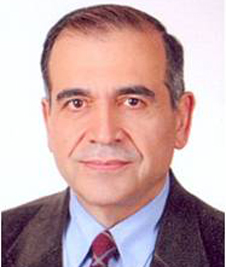 Mustafa Erdik is a Professor of Earthquake Engineering at, and currently serves as the Director of, Kandilli Observatory and Earthquake Research Institute in Bogazici University in Istanbul, Turkey. He has worked around the world on earthquake engineering problems. He is a member of the editorial board of several journals on earthquake engineering and serves in the executive board of professional societies on earthquake related subjects. He has authored and co-authored about 300 scientific publications including 5 books. In 1999 he was elected as the laureate of United Nation’s Sasakawa Disaster Prevention Award, in 2004 he has received the NATO Science for Peace – Summit Prize and in 2013 he was awarded the Bruce Bolt Medal by SSA, EERI and COSMOS. His current research interest is on strong ground motion characterization earthquake hazard and risk assessment. Born in Ankara, Turkey, Dr. Erdik received a B.S. degree (1970) from Middle East Technical University, Turkey, and the degrees of M.S. (1972) and Ph.D. (1975) from Rice University in Houston, Texas. Mustafa Erdik is a Professor of Earthquake Engineering at, and currently serves as the Director of, Kandilli Observatory and Earthquake Research Institute in Bogazici University in Istanbul, Turkey. He has worked around the world on earthquake engineering problems. He is a member of the editorial board of several journals on earthquake engineering and serves in the executive board of professional societies on earthquake related subjects. He has authored and co-authored about 300 scientific publications including 5 books. In 1999 he was elected as the laureate of United Nation’s Sasakawa Disaster Prevention Award, in 2004 he has received the NATO Science for Peace – Summit Prize and in 2013 he was awarded the Bruce Bolt Medal by SSA, EERI and COSMOS. His current research interest is on strong ground motion characterization earthquake hazard and risk assessment. Born in Ankara, Turkey, Dr. Erdik received a B.S. degree (1970) from Middle East Technical University, Turkey, and the degrees of M.S. (1972) and Ph.D. (1975) from Rice University in Houston, Texas. |
Crossing disciplinary and academic/practice boundaries to develop enhanced tools of risk governance
Scira Menoni, Politecnico di Milano, Italy
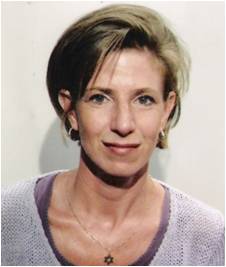 Scira Menoni is presently associate professor at the Politecnico of Milan, Department of Architecture and Urban Studies, teaching various courses at the international program offered by the Politecnico, Civil Engineering for Risk Mitigation. She also teaches at the CERG-C Specialisation certificate for the assessment and management of geological and climate related risk at the Geneva University, Switzerland. Field of specialization technological and natural risks prevention, looking particularly at non-structural measures. She has been involved and has coordinated EU funded research in the field of natural hazards, such as FP 6 Scenario (Support on Common European Strategy for sustainable natural and induced technological hazards mitigation), FP 7 Ensure (Enhancing resilience of communities and territories facing natural and na-tech hazards) projects; currently she is coordinating a Coordination Action, Kno-4-drr (Enabling knowledge for disaster risk reduction in integration to climate change adaptation). Through university/public administration agreements she has and still is consulting governmental agencies on risk mitigation and management related issues. Scira Menoni is presently associate professor at the Politecnico of Milan, Department of Architecture and Urban Studies, teaching various courses at the international program offered by the Politecnico, Civil Engineering for Risk Mitigation. She also teaches at the CERG-C Specialisation certificate for the assessment and management of geological and climate related risk at the Geneva University, Switzerland. Field of specialization technological and natural risks prevention, looking particularly at non-structural measures. She has been involved and has coordinated EU funded research in the field of natural hazards, such as FP 6 Scenario (Support on Common European Strategy for sustainable natural and induced technological hazards mitigation), FP 7 Ensure (Enhancing resilience of communities and territories facing natural and na-tech hazards) projects; currently she is coordinating a Coordination Action, Kno-4-drr (Enabling knowledge for disaster risk reduction in integration to climate change adaptation). Through university/public administration agreements she has and still is consulting governmental agencies on risk mitigation and management related issues. |
Towards Co-designing Resilience: Boundaries of a Contemporary Concept
Juergen Weichselgartner, University of Kiel, Germany
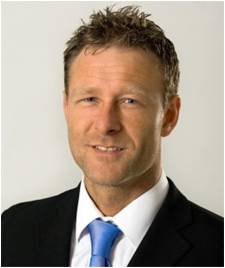 Juergen Weichselgartner: born 1968 in Aalen, Germany. Studied geography, political science, ethnology in Heidelberg, Malta, Santander and Bonn, M.Sc. 1997; 1999-01 Marie Curie Fellowship, University of Cantabria (Spain); PhD 2001 in Bonn with a system-theoretical analysis of the social discussion of natural risks, awarded by the Franzke’sche Foundation Berlin; 2002-04 Marie Curie Fellowship, International Institute for Applied Systems Analysis (IIASA) (Austria); 2004-06 JSPS Fellowship, Tokyo University (Japan); 2006/07 Feodor Lynen Fellowship, Harvard University (USA), 2010/11 NSC Fellowship, National Taiwan Normal University (Taiwan); 2007-12 Senior Science Coordinator, Helmholtz-Centre Geesthacht; currently, lecturer at the Geography Departments of the Universities of Bonn and Kiel. Several research projects, secretary of the International Geographical Union’s Commission „Hazards and Risks“, consultant and reviewer for international journals, e.g., IPCC-SREX, IPCC-AR5. Scientific activities: natural hazard and global change research, risk and disaster management, knowledge systems and science communication. Juergen Weichselgartner: born 1968 in Aalen, Germany. Studied geography, political science, ethnology in Heidelberg, Malta, Santander and Bonn, M.Sc. 1997; 1999-01 Marie Curie Fellowship, University of Cantabria (Spain); PhD 2001 in Bonn with a system-theoretical analysis of the social discussion of natural risks, awarded by the Franzke’sche Foundation Berlin; 2002-04 Marie Curie Fellowship, International Institute for Applied Systems Analysis (IIASA) (Austria); 2004-06 JSPS Fellowship, Tokyo University (Japan); 2006/07 Feodor Lynen Fellowship, Harvard University (USA), 2010/11 NSC Fellowship, National Taiwan Normal University (Taiwan); 2007-12 Senior Science Coordinator, Helmholtz-Centre Geesthacht; currently, lecturer at the Geography Departments of the Universities of Bonn and Kiel. Several research projects, secretary of the International Geographical Union’s Commission „Hazards and Risks“, consultant and reviewer for international journals, e.g., IPCC-SREX, IPCC-AR5. Scientific activities: natural hazard and global change research, risk and disaster management, knowledge systems and science communication. |
Digital Technologies, Complex Systems, and Extreme Events: Measuring Change in Policy Networks
Louise K. Comfort, University of Pittsburgh, U.S.A
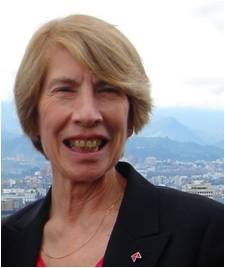 Louise K. Comfort is Professor of Public and International Affairs and Director, Center for Disaster Management, University of Pittsburgh. She is a Fellow, National Academy of Public Administration, and author or co-author of six books, including Designing Resilience: Preparing for Extreme Events, University of Pittsburgh Press, 2010 and Mega-Crises, Charles C. Thomas, 2012. Her primary research interests are in decision making under conditions of uncertainty and rapid change, and the uses of information technology to develop decision support systems for managers operating under urgent conditions. She has published articles on information policy, organizational learning, and sociotechnical systems, and is Associate Editor, Safety Science, and Book Review Editor, Journal of Comparative Policy Analysis. Louise K. Comfort is Professor of Public and International Affairs and Director, Center for Disaster Management, University of Pittsburgh. She is a Fellow, National Academy of Public Administration, and author or co-author of six books, including Designing Resilience: Preparing for Extreme Events, University of Pittsburgh Press, 2010 and Mega-Crises, Charles C. Thomas, 2012. Her primary research interests are in decision making under conditions of uncertainty and rapid change, and the uses of information technology to develop decision support systems for managers operating under urgent conditions. She has published articles on information policy, organizational learning, and sociotechnical systems, and is Associate Editor, Safety Science, and Book Review Editor, Journal of Comparative Policy Analysis. |
Why Risk Perceptions Resist Change?
Richard Eiser, University of Sheffield, UK
 Richard Eiser is a social and cognitive psychologist with theoretical interests in the fields of attitudes and social judgement, and applied interests in several risk-related areas, including smoking and health behaviours, nuclear power and energy policy, and natural hazards and disaster risk reduction. He has held positions at the Universities of Bristol, London, Exeter and Sheffield, and visiting positions including Waterloo and Carleton Universities in Canada. His publications comprise over 200 journal papers, and several books including Categorization and Social Judgement (with Wolfgang Stroebe) first published in 1972, and Attitudes, Chaos and the Connectionist Mind (1994). Richard Eiser is a social and cognitive psychologist with theoretical interests in the fields of attitudes and social judgement, and applied interests in several risk-related areas, including smoking and health behaviours, nuclear power and energy policy, and natural hazards and disaster risk reduction. He has held positions at the Universities of Bristol, London, Exeter and Sheffield, and visiting positions including Waterloo and Carleton Universities in Canada. His publications comprise over 200 journal papers, and several books including Categorization and Social Judgement (with Wolfgang Stroebe) first published in 1972, and Attitudes, Chaos and the Connectionist Mind (1994). |



